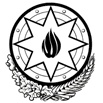First Vice-President Mehriban Aliyeva attends the opening ceremony of the 43rd session of the UNESCO World Heritage Committee in Baku


30 June 2019, 20:55
The 43rd session of the UNESCO World Heritage Committee has got underway in Baku.
First Vice-President of the Republic of Azerbaijan, UNESCO Goodwill Ambassador Mehriban Aliyeva attended the opening ceremony of the event.
First Vice-President Mehriban Aliyeva addressed the opening ceremony.
Speech of First Vice-President of the Republic of Azerbaijan Mehriban Aliyeva
Dear Madam Director-General,
Excellencies, ladies and gentlemen,
Dear friends,
Dear guests,
I am very glad to be here with you at the opening ceremony of the 43rd session of UNESCO World Heritage Committee. I am pleased to welcome you all in Baku, a city where East and West, past and future meet each other, is a unique harmony of times and civilization. It is a big honor for us to host this important gathering and I wish all success to your session.
I am particularly grateful to Madam Audrey Azoulay, the Director-General of UNESCO for her participation which I am sure will add special value to this event.
As UNESCO Goodwill Ambassador, I am very happy to greet all the members of UNESCO family who are with us today. Early this month we marked the 27th anniversary of Azerbaijan’s membership in UNESCO. During these years, we have established successful cooperation with the organization in multiple fields such as education, culture, science, communication, youth and sport. Today we participate in the work of UNESCO program through active representation and contribution. Protection of the world’s cultural heritage is one of the key directions of Azerbaijan-UNESCO cooperation. In the meantime, protection, restoration, and maintenance of our own historical religious and architectural monuments are in the center of Azerbaijan’s state policy. Back in 2001, the national list of cultural heritage was adopted in Azerbaijan that included more than 6600 cultural monuments which are under the state protection. In the course of last five years, 40 historical monuments have been restored in Azerbaijan. Let me also mention Gala Archeological and Ethnographic Museum Complex in the open air inaugurated in 2008 that brings together historical monuments and archeological finds discovered in the Absheron peninsula. Construction of Mugham center in Baku, Aghjabadi and Aghdam, reconstruction and building of new mosques, synagogues and churches, restoration and opening of new museums, they are all just a few elements of the policy of Azerbaijani state to protect and enrich its diverse cultural heritage. As a result of fruitful cooperation with UNESCO, two sites in Azerbaijan, namely Icherisheher, the Baku’s old city, including Shirvanshah’s Palace and Maiden Tower, as well as Gobustan rock art cultural landscape had been included in the UNESCO World Heritage List. Among other key elements of our rich and ancient culture, the pearls of our musical wealth, Mugham and Ashiq art were also included into the Representative List of the Intangible Cultural Heritage of Humanity. Azerbaijan’s devotion to the values and ideals of UNESCO goes beyond its national borders. In the last ten years our activity on preservation of the World Cultural Heritage has covered a wide geography. However, wars and military conflicts have always represented a serious threat to cultural heritage of humanity. As a result of military aggression and gross violation of international law and relevant UN Security Council resolutions, Armenia continues to occupy today almost 20 percent of Azerbaijan’s internationally recognized territory, including Nagorno-Karabakh and seven surrounding regions. One million of Azerbaijanis have become refugees or internally displaced persons. Hundreds of historical, architectural monuments, museums, mosques and other religious sights have been destroyed or seriously damaged. This is why Azerbaijan is very much interested in the effective implementation of relevant international conventions on the protection of cultural property. I believe that there is still much to do in this field and UNESCO has an important role to fulfil in this regard. Dear friends, cultural heritage offers us a shared sense of belonging to great story of humanity. It is our strong belief that the seeds of culture, of peace may be cultivated only through dialogue and mutual respect. I would like to mention here the Baku process initiated by Azerbaijan which became a truly global platform for promoting intercultural and interreligious dialogue. Launched back in 2008, in Baku, the international conference for the first time brought around one table ministers of culture of member states of Council of Europe with their colleagues from OIC states to start dialogue on issues of common concern. Last month we hosted 5th World Forum on International Dialogue within the Baku process. We are pleased that UNESCO is our key partner in this major initiative and I thank you Madame Director-General for your important personal support. Wishing every success to the work of this meeting I would like in conclusion to quote great Azerbaijani architect and philosopher of the 20th century Memar Ajami who said: “We will go but the wind will blow, we will pass away but heritage will live on.”
Thank you and once again welcome to Azerbaijan.
Thank you.
Director-General of UNESCO Audrey Azoulay, chairperson of the UNESCO Executive Board Byong-hyun Lee and Azerbaijan`s Minister of Culture Abulfas Garayev made speeches.
Participants in the session include more than 2500 delegates from 180 countries, including ministers, executives, representatives and ambassadors of international organizations in Azerbaijan, and members of the Azerbaijani government.
The Baku session will see the presentation of 36 out of 42 nominations for World Heritage List.
Azerbaijan became a member of UNESCO in 1992. The country signed a memorandum of cooperation with UNESCO in 1996. The Walled City of Baku, Shirvanshah’s Palace and Maiden Tower, and Gobustan Rock Art Cultural Landscape are featured as UNESCO World Heritage sites.
